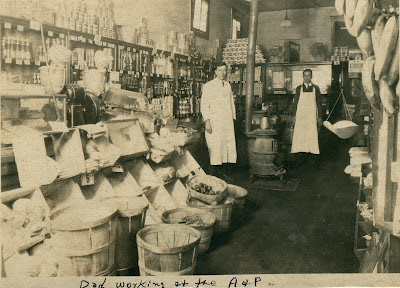Memories of Irondale, 1925 to 1942, Part V
by H. Bishop Holliman
This is the fifth in a series of reflections on an earlier Irondale, Alabama by my father, Bishop Holliman, born 1919. - Glenn N. Holliman
Bishop Holliman surveys 1st Avenue of Irondale, Alabama in November 2010. The café and buildings are still present but with different names and automobiles from the days of his childhood. The Model A Fords are gone. His brother-in-law’s Daly Hardware Store closed in 1960.
Below in 1976 Alvin W. Hudson and Harold E. Cox published a history of street cars in Birmingham, Alabama. In this work they stated that the rail line service extended in April 1913 to 'the newly developed town of Irondale'. In 1927, the cars ceased running and as Bishop Holliman notes, buses replaced them.
"Riders were given a free transfer from the bus to street cars in Woodlawn for completion of our ride into downtown Birmingham. In Woodlawn we transferred to No. 27 or No. 2 that would take us into town and/or Ensley or West End, all for seven cents!
Below, from the work 'Street Railways of Birmingham', is the route from Birmingham to Irondale. Although undergoing development as a work class suburb in the 1910s and 20s, Irondale as a settlement predates the much larger Birmingham.
"We transferred to the First Avenue car going to East Lake where there
was an amusement park with a merry-go-round, and several other rides. I think we went two summers. I guess it was the Depression beginning in
1929 that brought an end to that entertainment.
The street car was a big part of my life until I left in 1941 for the War. I rode it nearly every day to Birmingham
Southern College and any time I went to town."
The last street car to run in Birmingham was April 18, 1953 and an era ended.
This is the fifth in a series of reflections on an earlier Irondale, Alabama by my father, Bishop Holliman, born 1919. - Glenn N. Holliman
Bishop Holliman surveys 1st Avenue of Irondale, Alabama in November 2010. The café and buildings are still present but with different names and automobiles from the days of his childhood. The Model A Fords are gone. His brother-in-law’s Daly Hardware Store closed in 1960.
The Street Car…I can barely remember
riding the street car that came into Irondale on 2nd Avenue
North. It ran one block to 20th,
went down the short hill…past Ina Powell’s barber shop and Mr. Gaddis’
blacksmith shop, turned right on 1st Avenue North in front of the
grocery store, drug store and hardware store.
Then back up the slight hill on 19th Street and headed back
to town. It must have been 1927 that they replaced the street car with the bus.
The fare was seven cents."
Below in 1976 Alvin W. Hudson and Harold E. Cox published a history of street cars in Birmingham, Alabama. In this work they stated that the rail line service extended in April 1913 to 'the newly developed town of Irondale'. In 1927, the cars ceased running and as Bishop Holliman notes, buses replaced them.
"Riders were given a free transfer from the bus to street cars in Woodlawn for completion of our ride into downtown Birmingham. In Woodlawn we transferred to No. 27 or No. 2 that would take us into town and/or Ensley or West End, all for seven cents!
Most
folks rode street cars/busses in the 1920s and up into the 1930s, and again
during World War II. Daddy (Ulyss S. Holliman) worked for
the street car company (Birmingham Electric Company). The first street car ride I remember was to East
Lake Park when I was about six years old."
Below, from the work 'Street Railways of Birmingham', is the route from Birmingham to Irondale. Although undergoing development as a work class suburb in the 1910s and 20s, Irondale as a settlement predates the much larger Birmingham.
The last street car to run in Birmingham was April 18, 1953 and an era ended.
More Irondale, Alabama memories in next post....

.jpg)






